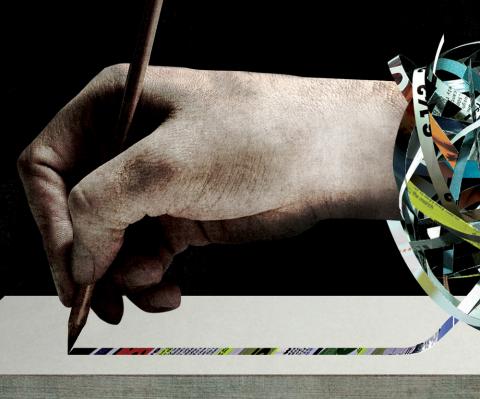 Emily Dickinson’s use of the dash was unique to the poetry of her time and became a mark of distinction, so to speak. It was as if she avoided ending certain key lines with standard periods and ellipses in order to give typographical recognition to a pause for thought. W.S. Merwin once said that he abandoned punctuation entirely after realizing it “seemed to staple the poem to the page.”* Edward Estlin Cummings famously signed his name without capital letters and used punctuation, syntax and symbols in novel ways specific to each poem, making tiny diacritical and punctuation elements almost as important as the words themselves. Thus, parentheses were left unclosed or printed backwards, the pronoun “I” almost always appeared in lower case, and colons and quotation marks were given new meaning. Early reviewers and publishers sometimes “corrected” his work, infuriating him. It’s not difficult to imagine what he would have done with today’s autocorrect.
Emily Dickinson’s use of the dash was unique to the poetry of her time and became a mark of distinction, so to speak. It was as if she avoided ending certain key lines with standard periods and ellipses in order to give typographical recognition to a pause for thought. W.S. Merwin once said that he abandoned punctuation entirely after realizing it “seemed to staple the poem to the page.”* Edward Estlin Cummings famously signed his name without capital letters and used punctuation, syntax and symbols in novel ways specific to each poem, making tiny diacritical and punctuation elements almost as important as the words themselves. Thus, parentheses were left unclosed or printed backwards, the pronoun “I” almost always appeared in lower case, and colons and quotation marks were given new meaning. Early reviewers and publishers sometimes “corrected” his work, infuriating him. It’s not difficult to imagine what he would have done with today’s autocorrect.
For several years, I hung on to traditional punctuation in my poetry in an effort to achieve clarity. Eventually, I realized that clarity might be an important goal for the professional writer, by which I earned my living for over 30 years, but was often anathema to the best lyrical poetry, which can benefit from a certain degree of conscious ambiguity and enigma (not to be confused with muddled thinking). For me, the further I separated my poetry from my rational, expository writing, the more heart-centered, musical and transcendental my mind became. Except for prose poems (and blogs), I've largely discarded routine punctuation at this point, at the risk of occasional confusion. I’ve concluded that punctuation, and common grammatical conventions in poetry, can become a type of control, not unlike form, meter, rhyme scheme and line length. The more control, the less blood to my heart.
In “All of the Above: A Personality Test,” a James Hearst Poetry Prize finalist a few years ago, I added the novel element of the check box (□) to separate the lines and to mimic the questionnaire form. I felt that the absurdity of making certain choices was crucial to the poem, and the check box emphasized the point for me. Here are a few stanzas:
You usually prefer
□ Old things
□ Chopin
□ Children in fairy tales
It makes you happy to know that
□ Whales are sometimes born with legs
□ Men can lactate
□ There are two million flowers in a jar of honey
You have difficulty with
□ Blood on faces
□ Finding meaning for others
□ The notion that sponges are inferior
In the following poem, recently published in Trajectory, line and stanza breaks make punctuation redundant, while capital letters serve as a clue that a new sentence has begun.
KINDER
I could have been kinder
like a tree is kind
like a rainbow
like a spoon
Kind is not the same as nice
Nice is how you act
Kind is how you help
I could have been kinder
to Melissa
who only wanted
to be looked forward to
I could have been kinder
to Steve
who didn’t understand
that friendship
isn’t asked for
love isn’t earned
I could have been kinder
the way time can be kind
to strangers
to youth
to the wounded
I concede that most poets will feel the need for an occasional question mark or comma, for example, or Emily Dickinson’s em dashes, to avoid misunderstanding or to underscore intent. But in the end, the use of punctuation is mostly a visual one, since typographical marks are usually unpronounced elements of the poem that only appear in written form; it matters little to the oral tradition, which for me is always the final test. In my case, the absence of punctuation has the additional advantage of liberating my mind during the writing process, unstapling it from my past, so to speak.
*American Poetry Observed, Joe David Bellany, ed., Illini Books, 1988
Illustrations by: Anthony Tremmaglia. Anthony Tremmaglia is an Ottawa-based illustrator, artist, and educator. His clients include WIRED, Scientific American, Smart Money, HOW, and San Francisco Weekly.




